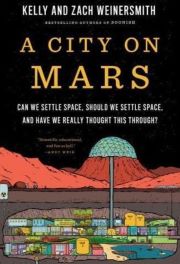A City On Mars: Can We Settle Space, Should We Settle Space, and Have We Really Thought This Through?

Kelly and Zach Weinersmith
Penguin, £25.00
American biologist Kelly Weinersmith, together with her cartoonist husband, Zach, has for several years been exploring the increasingly popular idea that we must settle in space to secure the future of our species.
The resulting book, A City on Mars, has quickly become a New York Times bestseller. It’s hugely entertaining, thanks to Kelly’s funny yet deeply researched essays on the mad realities of space colonisation, and Zach’s zany diagrams, cartoons and illustrations.
The book is also surprisingly frustrating, heartbreaking even. Because for all the authors' research showing how space settlement will be near impossible, absurdly costly and, most of all, plain horrible, many of the world’s wealthiest people still seem far more interested in going there than making our current planet liveable.
The hard facts against space colonisation include, but are not limited to: the appalling health impacts of just a few months spent in space; the highly toxic nature of the lunar and Martian surface; our absolute lack of data on conception, pregnancy and birth in zero gravity; the near impossible problem of providing food, oxygen and water to large populations; and so on. The grim reality for plucky Martian ‘pioneers’ will be a 140-million mile one-way trip to an airless frozen planet of dust storms and radiation-baked gravel, to live out life in a converted lava tunnel eating spuds grown in your own poo. As the authors put it: “Earth with climate change, nuclear war and even with zombies and werewolves would still be better than Mars.”
It’s not just the physiological realities of space colonisation that the Weinersmiths worry about: there are excellent sections on the governance of off-planet societies, the likelihood of global conflict over extraterrestrial resources, and the horrifying politics of sending thousands of people a year to a dangerous and depressing new home.
After cheerfully dismantling most of the arguments for space settlement in the opening salvo, the majority of the book sees the authors – both self-confessed 'space nerds' – having fun thinking about how they’d go about doing it anyway. Working through the various problems one will encounter when trying to make a permanent home in space makes it clear again and again that there are infinitely more desirable and sensible paths forward for us here on Earth – ones that don’t involve making concrete at -130°C or having babies in a spinning gravity wheel. Even if the billionaire space settlers’ far-fetched ideas are ever made possible, they certainly aren’t going to be ready to the scale and timeframe needed to save us from the impending trouble here on Earth.
Still, it really is fun to imagine life ‘off-planet’. So fun that it has captured the imaginations of several of our planet’s most powerful men. I do hope they read A City on Mars and pause to reflect on which planet is best to pour money into making liveable, but I suspect they won’t.
Tom Ireland MRSB


